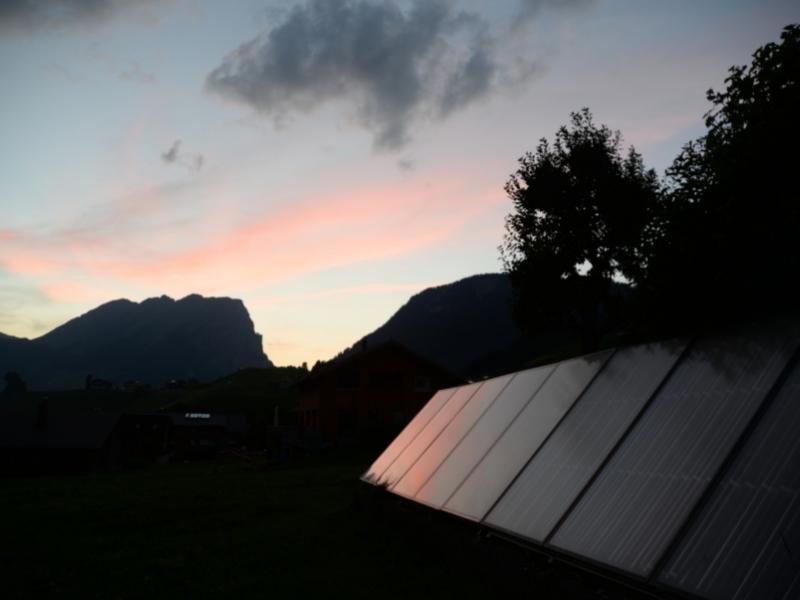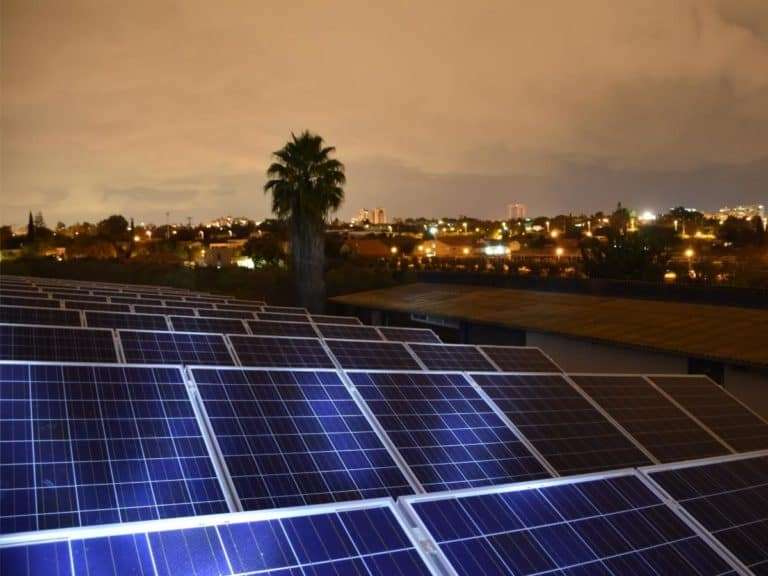If you live somewhere sunny, you’ve probably considered jumping to solar energy for your house or business or just partially supplementing your energy supply using solar panels.
One of the main concerns about solar panels is whether you will still have energy at night, on cloudy days, or in winter.
We’ll look at:
- How do solar panels function, exactly
- Whether or not solar power can be used at night
- Whether or not solar panels can be powered by moonlight
- Whether or not solar panels work on cloudy days
- How many hours of sunlight do solar panels require
So, if you’ve ever considered getting solar panels and are concerned about power at night, we have the answers you need!

Do Solar Panels Work At Night?
No, solar panels don’t work at night. Solar panels use photovoltaic cells, which react to sunlight to create energy. However, there are two ways in which you can use sustainable solar energy during the night.
While energy produced during the day can be stored in a battery, if your solar system has this capacity, the solar panels will not generate any new electricity at night.
Net metering is the alternative solution that solar energy can be used indirectly at night.
Solar Battery Storage
While solar panels produce energy during the day, solar batteries take the night shift.
When your solar panels produce excess energy you don’t use during the day; you can either send it to the grid or store it in a battery for your consumption.
When you need energy at night, your system will first draw from the battery before the grid, lowering bills!
Solar battery storage is the best solar backup, offering a solution for nighttime or power outages. It allows you a dependable source of your energy, which will both give you peace and mind and help to reduce your energy bills.
See also: How Does Weather Affect Solar Panels? Unveiling The Truth
Net Metering
This is less a way that solar energy can be used at night and more of an exchange system that your solar energy provides. Net metering is enabled when you connect your solar panels to the electric grid.
As your solar panels produce energy during the day, excess of this is deposited on the grid.
What then happens is that the electricity company gives you credits or reimburses you for the energy you have contributed.
At night, you can then use these energy credits, which you banked during the day, to draw on electricity from the grid.
Instead of a battery where you store the excess, you feed it back to the grid and then draw on the grid when you need it at night.
Net metering policies vary in different areas. Because solar energy is increasing in popularity, electric companies need to stay profitable. They may charge you more to buy back the power than the amount they initially credited you for it.
As such, having your battery is a more dependable solution to storing your excess solar energy for use at night.

Can Solar Panels Charge With Moonlight?
While lunar panels are separate and only in the early phases of development, moonlight does not provide the kind of light that will convert to energy when it hits solar panels.
All light is not created equal, and moonlight does not have the same properties as sunlight when interacting with solar panels.
The moon does not generate its light; solar panels need direct or indirect contact with sunlight to be effective. While moonlight is reflected sunlight, the indirect light required by solar panels includes that reflected off clouds.
Electrons in the solar panel are charged by photons in the sunlight, so as soon as the sun goes down, the electrons are no longer exposed and don’t produce any energy.

How Do Solar Power Plants Work At Night?
In general, heat can be more easily stored than electricity can. In this way, heat from solar energy can be stored in thermophotovoltaic solar cells and can continue to be used to produce electricity even after the sun has gone down.
This is an excellent way of effectively utilizing the heat absorbed during the daytime and continuing to generate energy using just stored heat without direct sunlight.
Do Solar Panels Work On Cloudy Days?
Cloudy days are not the same as nighttime in terms of solar power and can still generate electricity through the clouds, but they don’t perform as well as on sunny days.
While we’ve learned solar panels can power your home at night but don’t produce power at night, where does this leave you on cloudy days?
Depending on the amount of cloud cover, solar panels typically generate between 10 and 30% of their usual energy capacity on a cloudy day, so they don’t work as well as during sunny periods.
If you live somewhere cloudy or with a lot of fog, it might still be worth getting solar panels if your cost of electricity is high and you want to reduce this.
Good to note is that the same applies to trees. Even though solar panels may be covered by shade for most of the day, they will still be able to work using indirect sunlight reflected off the leaves, though just not as effectively as unblocked, direct sunlight.

How Many Hours Of Sunlight Do Solar Panels Need?
Solar panels need between four and five hours of sunlight per day to work optimally. Ideally, this sunlight should be between 10 am and 3 pm, when the rays are most direct and strongest, producing the most energy.
If some trees or buildings obscure the solar panels during these hours, it is advisable to try and find a different location for them.
Alternatively, finding a solution to unblock the solar panels, such as pulling branches of a tree back to expose the panels more directly, would be optimal for getting the most efficient use out of your panels.
Resources:



